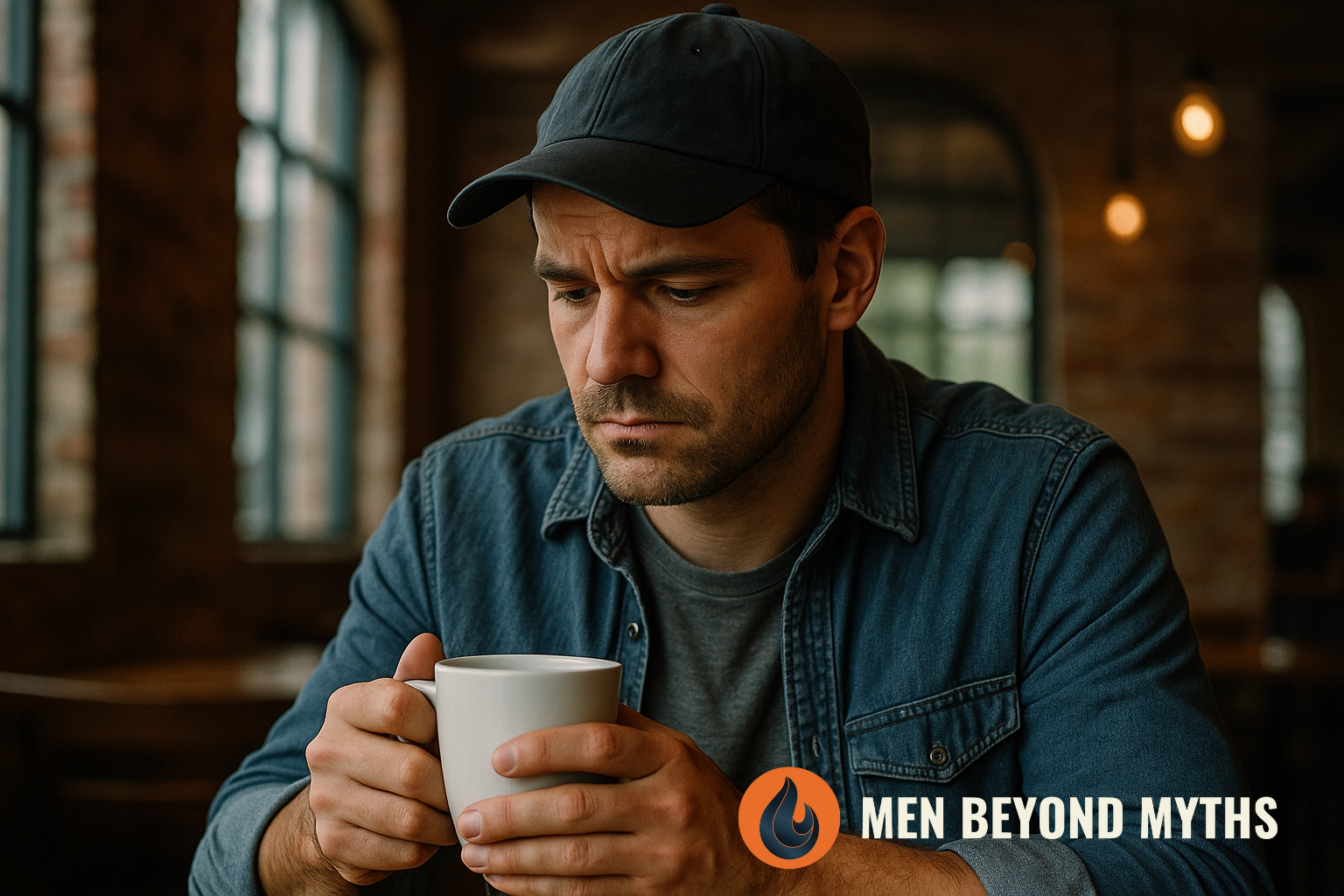Why Do We Equate Strength With Going It Alone?
When did we start believing that independence was the same thing as strength?
That asking for help—or even admitting we’re struggling—somehow makes us less of a man?
If you’ve ever felt the weight of that expectation, you’re not alone. Most of us were raised to see self-reliance as the core of masculinity, and somewhere along the way it hardened into something else: isolation.
The Coffee Shop Moment
The coffee shop was buzzing that day. This wasn’t a quiet, library-style refuge; it was the kind of space where noise itself becomes a balm. The hum of grinders and low conversations worked like organic white noise, letting me slip out of my head without disappearing into a void.
An old VW bus—refurbished into a seating nook—sat parked against one wall, its rounded rooftop echoing the high ceilings of what must have been a warehouse decades ago. It was the sort of place I came to feel alone together with other people.
Aaron was behind the bar that day, cool ball cap perched just so, moving with calm precision. He wasn’t phoning it in like some folks do when they’re over a job; he seemed tuned to every detail.
When he looked up and said, “Hey, how’s your day?” my brain nearly defaulted to autopilot: “I’m fine, thanks.” That script had served me for years—another mask in the myth of the self-sufficient man.
Only I wasn’t fine. I was dying on the inside. I was in the middle of a separation, navigating depression, and doing serious work with a therapist to unlearn the lie that vulnerability equals weakness.
In that split second, I felt two paths: the familiar, polite lie… or the frightening truth. Did I consciously choose the latter, or was I simply too tired to keep hiding? I only know that when I opened my mouth, something raw came out.
“Honestly,” I heard myself say, “I’m really struggling today, but thank you for asking.”
Time slowed. I half-expected Aaron to stare at me like I’d sprouted a third eye and dropped it on his freshly wiped counter. Instead, his face softened. “I’m sorry,” he said, genuinely. “I hope your day gets better.”
Relief washed through me. I sat down with my latte feeling lighter, as if just speaking the truth had cracked my armor. That moment became an early exercise in shedding the masks that had kept me isolated—masks built from generations of conditioning about what it means to be a man.
The Masks We Inherit
I hadn’t realized it at the time, but those masks were feeding my depression. They would eventually pull me into one of the darkest moments of my life before I finally understood that I could shed them for good.
These are the masks we wear whenever we try to fit into someone else’s expectations for how we’re supposed to look, act, and perform—scripts handed down through families, friends, workplaces, and cultural myths.
I grew up watching my dad model those same patterns: a good man, dependable, stoic, and quietly suffering under the weight of expectations he never chose. It’s a cycle that keeps repeating until someone names it.
Men’s isolation isn’t just personal—it’s cultural, systemic, and mythic. This isn’t just my story; it’s a pattern I see everywhere.
The “Self-Sufficient Man” Myth
Men are taught to value self-reliance and stoicism. We believe we should solve our own problems, never burden others, and always say “I’m fine.”
But this myth is eroding our connections. Surveys show that 15 % of U.S. men had no close friends in 2021—up from 3 % in 1990 and that the share with ten or more friends dropped from 33 % to 13 % (The Guardian).
Mid-life men, in particular, often depend on partners for socializing, dive into parenting or careers, and lose touch when they move. When marriages or relationships end, many find themselves emotionally stranded (The Guardian).
A 2025 Gallup poll found that 25 % of American men aged 15–35 reported feeling lonely for much of the previous day, while global data shows that men die by suicide at roughly four times the rate of women.
Lack of close friendships isn’t the only factor, but clinging to the myth of self-sufficiency clearly isn’t serving us.
Vulnerability as Rebellion
Over the next few visits, Aaron began sitting down at my table on his break. We’d chat about music or life. Eventually we started grabbing drinks every couple of weeks.
He later told me how rare it is for someone to answer honestly—and how my genuine reply to a mundane question sparked both curiosity and respect. My therapist had been right: vulnerability can act like a magnet.
Each time I chose honesty, I took another swing at the myth that men must be stoic or go it alone.
In therapy I practiced saying out loud, “I’m not okay,” and letting that be enough. I confronted the fear that people would find me “too much” and discovered most were relieved to drop their own masks. Yes, sometimes honesty was met with awkwardness. But often, like with Aaron, it opened a door.
Friendship Takes Time and Intention
Intimacy doesn’t happen overnight. Studies show it takes 40–60 hours to move from acquaintances to casual friends, 80–100 hours to become friends, and more than 200 hours to form a close friendship.
That’s a lot of coffees, hikes, texts, and small moments of showing up. Men also tend to have lower expectations for friendship and are less likely to receive emotional support than women (The Guardian).
It’s not surprising that many connections fade when we don’t nurture them or share more than surface-level updates.
Choosing Connection Over Myth
What does it actually mean to live differently—to reject the myth of self-sufficiency and choose connection instead?
Here are a few practices that have helped me:
- Answer honestly. Every time you drop the “I’m fine” script, you challenge a harmful narrative. Even a small truth (“I’m overwhelmed at work”) invites real connection.
- Invest the hours. Relationships need time. Schedule regular hangouts or check-ins. Don’t assume friendship will maintain itself.
- Share the messy stuff. Being authentic is risky, but it’s also magnetic. It signals that you’re safe for others to be real with you.
- Ask better questions. Instead of small talk, try “What’s been challenging you lately?” or “What’s bringing you joy?” Depth grows through curiosity.
- Celebrate progress. Recognize each moment you choose connection over isolation. They add up.
A New Story
My coffee-shop encounter taught me that honesty isn’t weakness—it’s rebellion against a myth that’s quietly killing us. Vulnerability didn’t push Aaron away; it made him lean in.
Maybe it’s time we stop measuring strength by how much we can endure alone. Maybe strength looks like choosing to show up, to listen, to be seen.
We don’t have to go it alone. We can write a new story about what strength and friendship really look like.
What’s one small way you could challenge the self-sufficient man myth today?
Whose eyes might light up when you do?
Sources
- The Guardian – “An uphill battle: why are midlife men struggling to make—and keep—friends?” (2025)
- Survey Center on American Life – “The State of American Friendship: Change, Challenges, and Loss” (2021)
- Gallup – Global Emotions Report 2025 (2025)
- Our World in Data – Suicide Rate by Gender (2025)
- Evidence-Based Mentoring – How long it takes to make a friend (2018)


